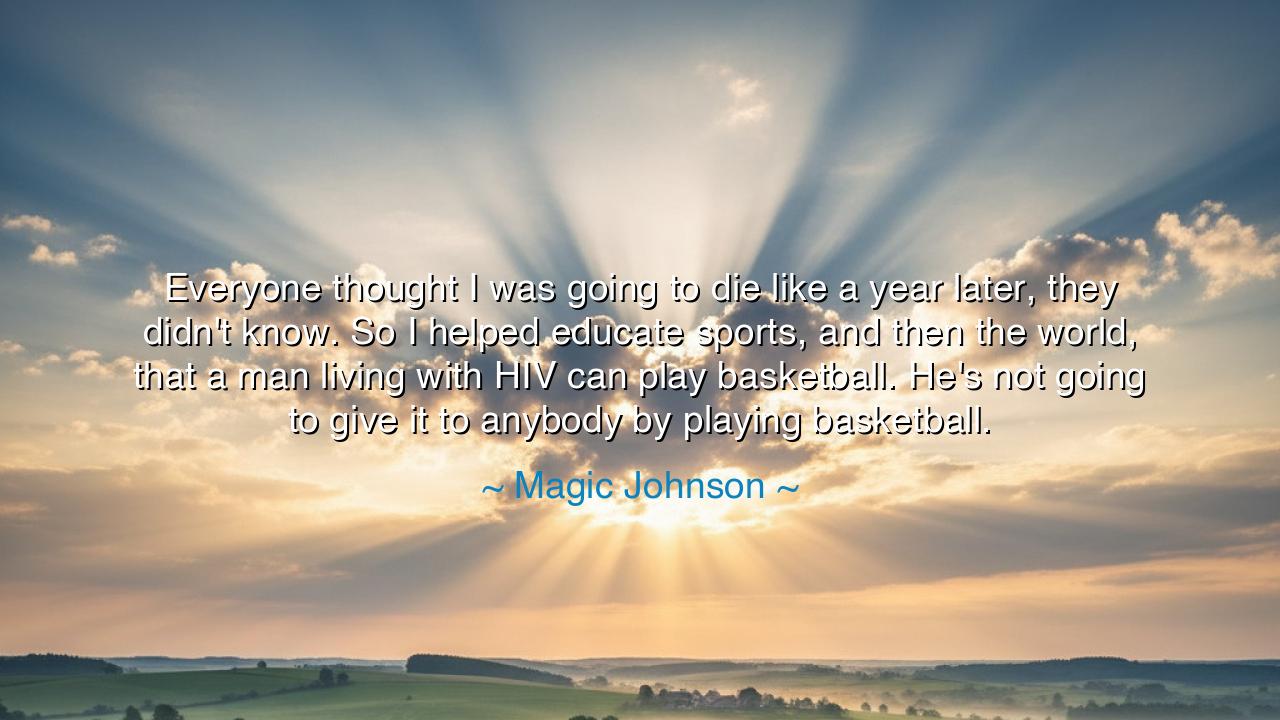
Everyone thought I was going to die like a year later, they
Everyone thought I was going to die like a year later, they didn't know. So I helped educate sports, and then the world, that a man living with HIV can play basketball. He's not going to give it to anybody by playing basketball.






When Magic Johnson declared, “Everyone thought I was going to die like a year later, they didn’t know. So I helped educate sports, and then the world, that a man living with HIV can play basketball. He’s not going to give it to anybody by playing basketball,” he spoke as one who had wrestled both fear and ignorance, and emerged a beacon of courage. His words are not only about the disease that sought to silence him, but about the breaking of stigma, the tearing down of myths, and the lifting of hope for millions who had been cast into the shadows of misunderstanding.
The ancients often revered those who shattered fear with truth. In the days of plague and pestilence, brave men and women who dared to touch the sick or care for the afflicted were honored as saints and heroes. Magic Johnson, through his courage to play basketball openly with HIV, stood in this same tradition. Where many recoiled in terror, he revealed that knowledge dispels fear, that compassion defeats prejudice, and that strength is found not in hiding but in standing before the world unashamed.
His words recall the ignorance of the early 1990s, when HIV was seen as a death sentence and those diagnosed were shunned. “Everyone thought I was going to die like a year later,” he confessed, unveiling the climate of dread that surrounded him. Yet rather than surrender, he used his fame, his visibility, and his presence on the basketball court to challenge the lies. By continuing to train, compete, and live with dignity, he showed that HIV was not a curse that excluded men from society or from the joy of sport.
History gives us a mirror in Galileo, who, facing a world blinded by fear of new knowledge, dared to say that the earth revolved around the sun. Though condemned at first, his persistence eventually changed the world’s understanding of the cosmos. So too did Magic Johnson, who dared to live and play openly, change the world’s understanding of HIV. His battle was not only personal but universal—fought not only for his own dignity, but for the millions living with the same burden.
In his words we also hear the triumph of education. He says, “I helped educate sports, and then the world.” The power of his legacy was not in statistics alone, but in the transformation of thought. Fear crumbled when exposed to truth. Prejudice weakened when faced with compassion. This is the mark of all great teachers—not only to instruct with words, but to educate with their very lives, their courage becoming the lesson.
The lesson for us is profound: when faced with fear or ignorance, do not hide, but shine. Whatever the stigma, whatever the prejudice, whatever the doubt—step forward with courage and let truth be seen. One life, lived openly and with dignity, can change the minds of thousands. Just as Magic Johnson showed that an athlete with HIV could live, thrive, and inspire, so too can each of us, in our own struggles, teach the world what is possible.
Practically, this means embracing honesty in our challenges, refusing to let shame silence us, and committing to educate others with patience and courage. It means treating those who suffer not with fear, but with dignity, remembering that ignorance harms far more than disease. And above all, it means using whatever platform we have—whether small or great—to break barriers for those who cannot yet speak.
Thus, Magic Johnson’s words remain not only a reflection of his own life, but a call to all generations: do not let fear dictate truth, do not let ignorance breed hate, and do not let illness erase dignity. Stand, speak, and live openly—for by doing so, you not only save yourself, but you light the way for the world.






AAdministratorAdministrator
Welcome, honored guests. Please leave a comment, we will respond soon